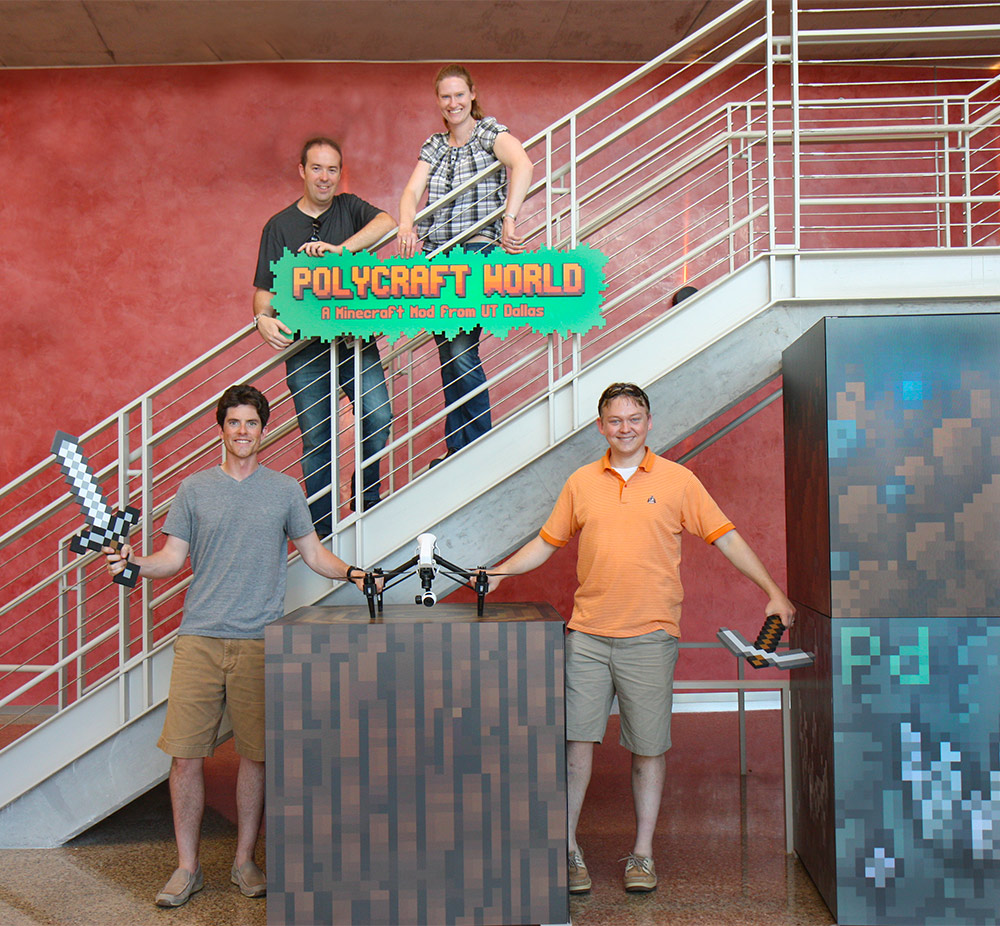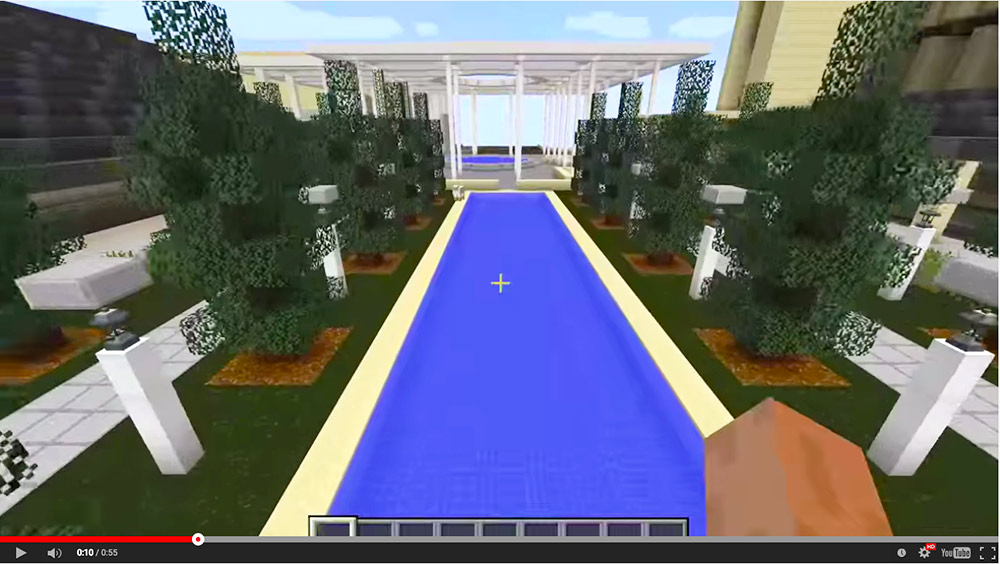
Clockwise from top left: Dr. Ron Smaldone, Dr. Christina Thompson, Dr. Walter Voit and UT Dallas alumnus James McAndrew are part of the team that created one of the most comprehensive modifications to the video game “Minecraft.”
A UT Dallas team of faculty, students and alumni has been working for more than a year to develop “Polycraft World,” one of the most comprehensive modifications, or mods, available for the popular video game “Minecraft.”
On Friday, access to servers hosting the beta version of the mod was free for the first 10,000 users.
“Minecraft” allows players to mine, harvest and alter a virtual world. Players craft and process harvested blocks into tools, weapons and refined goods to build civilizations on massive multiplayer servers such as the ones UT Dallas is using to host “Polycraft World.”
The UT Dallas team, led by Dr. Walter Voit BS’05, MS’06, has found clever ways to make the game more fun with exotic items such as flamethrowers, jetpacks, scuba gear and pogo sticks.
Users can access the items once they learn how to manipulate new resources that have been introduced into the game thanks to the mod. The resources include crude oil, shale, titanium, magnesium, nickel, antimony, tungsten, platinum, bismuth and aluminum.
‘Polycraft World’
To play the game, click here.
Access more information about the “Minecraft” modification at polycraft.utdallas.edu and instructional videos on YouTube.
“Our team of chemists, programmers and engineers has found ways to teach ‘Minecraft’ users more advanced materials processing in an engaging way,” said Voit, a materials science and engineering professor in the Erik Jonsson School of Engineering and Computer Science.
“For instance, to make a flamethrower, Polycrafters must first inject mold gaskets from natural rubber, extrude polymer hoses, distill and refine crude oil into propane, synthesize Kevlar from its base constituents in a chemical processor and craft these items together.”
Voit said that Polycrafters can “tech up” during gameplay by building increasingly complex processing equipment to refine materials, starting with machining mills, injection molders and extruders, and moving to distillation columns, steam crackers, industrial ovens and chemical processors.
“Players might spend 10 to 20 hours to get to this elite endpoint — crafting a flamethrower — but would learn about real-world materials processing at every step along the way,” Voit said.
To turn users into “Polycraft World” experts, the UT Dallas team has created more than 1,000 Wikipedia-style help pages.
The artwork in the game was envisioned, designed and created by current and former UT Dallas arts and technology students Bobby Frye, Steve Zapata and Eli Britton, while UT Dallas students, staff and affiliates served as alpha testers.

Part of the UT Dallas campus is captured in “Polycraft World.” You can view the video here.
Starting Friday, the first 10,000 users to sign up will receive a plot of virtual private property on a UT Dallas-hosted server.
Players then will have a personal scratch space to innovate and create. They can seamlessly move back and forth between UT Dallas and their private property, or explore the uncharted virtual world at large to find hidden Easter eggs, or hidden objects, left by the developers.
“As online education slowly diffuses into academia, it may turn out to be that a simple, fun, engaging approach like modified ‘Minecraft’ becomes the kind of teaching tool to reach wide audiences and teach students young and old about materials processing,” Voit said.
Dr. Ron Smaldone, mod co-developer and assistant professor of chemistry at UT Dallas, has injected chemical balance and realism into the mod, helping to create many of the more than 2,000 recipes that can be used to craft 100 different polymers from thousands of chemicals. He helped develop detailed distillation trees to teach users how to get from raw resources such as crude oil, tar sand, ores or biomass into usable fuels, monomers, catalysts and compounds.
“Our team of chemists, programmers and engineers has found ways to teach ‘Minecraft’ users more advanced materials processing in an engaging way.”
Dr. Walter Voit,
materials science and engineering professor in the Erik Jonsson School of Engineering and Computer Science
The underlying chemistry engine drives much of the educational value of the first launch of the game, Smaldone said.
“We can teach users advanced chemical synthesis, not just because they have to learn it for a class, but because they want to learn it, to be able to build overpowered items in ‘Polycraft World’ and show off to their friends,” he said.
UT Dallas alumnus James McAndrew BS’04, MS’06, the lead programmer on the “Polycraft World” team, developed the bulk of the code base.
Voit and McAndrew have worked together on numerous projects over the past decade culminating in their joint efforts to develop “Polycraft World.” Other projects McAndrew has developed include the popular drone software platform Autopilot, which allows users to fly drones with their iPhones, and SyncSolver, an app that allows Fitbit users to sync personal health and fitness data with Apple Health.
Recently, McAndrew brought in full-time programmer Chris Friend to the team. Friend specializes in complex server architectures and will manage the growing “Polycraft World” community.
Voit was part of the inaugural class of Eugene McDermott Scholars and earned a bachelor’s degree in computer science and a master’s degree in intelligent systems from UT Dallas. He returned to teach at UT Dallas after earning his doctorate in materials science and engineering from Georgia Tech.
